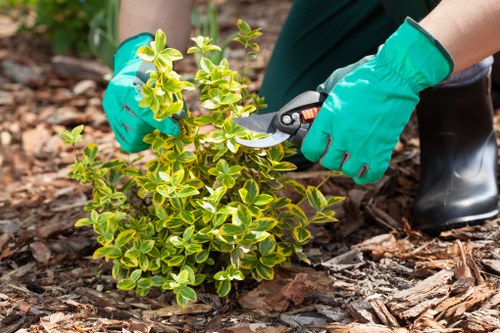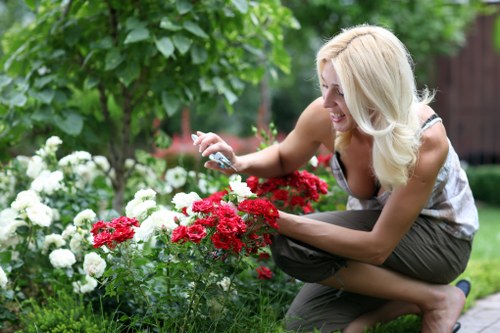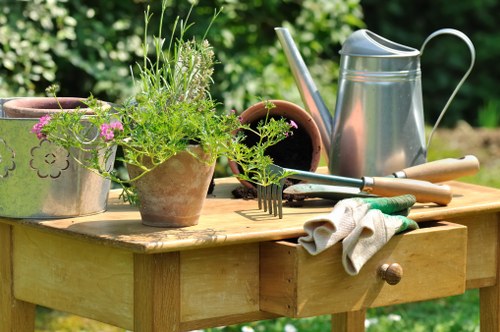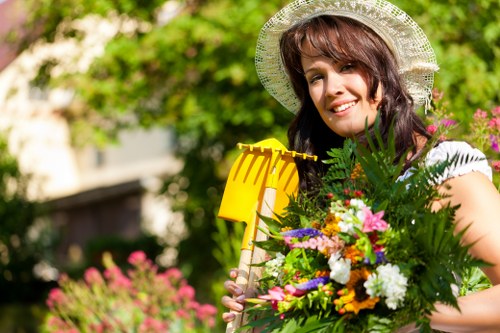Garden Maintenance in Paddington: Keeping Your Outdoor Space Pristine

Maintaining a beautiful garden in Paddington requires regular care and attention. Whether you're a seasoned gardener or a novice, understanding the essential practices can help your garden thrive all year round.
Paddington's unique climate presents both opportunities and challenges for garden enthusiasts. From the mild winters to the warm summers, knowing how to adapt your maintenance routines is key to a flourishing garden.
In this comprehensive guide, we will explore various aspects of garden maintenance in Paddington, offering tips and insights to help you achieve a stunning outdoor space.
Understanding Paddington's Climate

Paddington experiences a temperate climate, characterized by mild winters and warm summers. This climate is ideal for a wide range of plants, but it also means gardeners need to be prepared for sudden weather changes.
The average rainfall in Paddington is distributed throughout the year, reducing the likelihood of droughts. However, occasional heavy rains can lead to waterlogged soil, affecting plant health.
Understanding these climatic conditions helps in selecting appropriate plants and planning maintenance activities effectively.
Choosing the Right Plants

Selecting plants that are well-suited to Paddington's climate is crucial for minimizing maintenance efforts and ensuring plant health. Opt for native species or those known to thrive in similar conditions.
Consider factors such as sunlight exposure, soil type, and moisture levels when choosing plants. This will reduce the need for constant adjustments and interventions.
Popular choices in Paddington include:
- Eucalyptus trees
- Lavender
- Roses
- Succulents
- Ferns
Essential Garden Maintenance Tasks

Regular maintenance is the backbone of a healthy garden. Here are some essential tasks every Paddington gardener should incorporate into their routine:
- Weeding: Removing weeds prevents them from competing with your plants for nutrients and water.
- Watering: Ensure your plants receive adequate water, adjusting for seasonal changes.
- Pruning: Regular pruning promotes healthy growth and prevents overgrowth.
- Fertilizing: Supplementing the soil with fertilizers boosts plant health and productivity.
- Pest Control: Monitor for pests and diseases, addressing issues promptly to prevent spread.
Incorporating these tasks into a weekly or monthly schedule can help maintain your garden's beauty and vitality.
Soil Health and Management

Healthy soil is the foundation of a thriving garden. In Paddington, the soil composition may vary, so conducting a soil test can provide valuable insights.
Based on the results, you can amend the soil to improve its structure, drainage, and nutrient content. Adding organic matter such as compost or manure enhances soil fertility and microbial activity.
Regularly aerating the soil helps in preventing compaction, ensuring that plant roots can access essential nutrients and oxygen.
Seasonal Garden Care
Adapting your maintenance routines to the changing seasons ensures year-round garden health. Here’s a breakdown of seasonal tasks:
Spring
Spring is a time of renewal. Start by clearing any debris from the winter months and preparing the beds for new growth.
- Planting new shrubs and flowers
- Pruning back perennials
- Applying mulch to retain moisture
Summer
As temperatures rise, focus on maintaining adequate moisture levels and providing shade for sensitive plants.
- Regular watering, preferably in the early morning
- Deadheading flowers to promote continuous blooming
- Monitoring for pests and diseases
Autumn
Autumn preparation sets the stage for a resilient garden in winter.
- Collecting fallen leaves to prevent fungal growth
- Planting bulbs for spring blooms
- Dividing overcrowded plants
Winter
Winter requires minimal but strategic care to protect your garden from harsh conditions.
- Mulching beds to insulate roots
- Pruning dormant trees and shrubs
- Planning for the upcoming gardening season
Tools and Equipment for Effective Maintenance
Having the right tools can make garden maintenance more efficient and enjoyable. Essential tools for Paddington gardeners include:
- Pruning shears: For trimming and shaping plants.
- Garden fork: Useful for turning soil and aerating beds.
- Watering can or hose: Essential for providing adequate hydration.
- Wheelbarrow: Helps in transporting materials like soil and compost.
- Gloves: Protect your hands during various gardening tasks.
Choosing Quality Tools
Investing in high-quality tools ensures durability and better performance. While the initial cost may be higher, quality tools often last longer and provide a more comfortable user experience.
Regular maintenance of your tools, such as cleaning and sharpening, extends their lifespan and keeps them in optimal condition.
Eco-Friendly Garden Practices
Embracing eco-friendly practices not only benefits the environment but also enhances the health of your garden.
- Composting: Recycle organic waste into nutrient-rich compost for your beds.
- Rainwater harvesting: Collecting rainwater reduces reliance on municipal water sources.
- Integrated Pest Management (IPM): Utilize natural predators and organic treatments to manage pests.
- Native plants: Selecting native species supports local biodiversity and reduces maintenance needs.
Reducing Chemical Usage
Minimizing the use of chemical fertilizers and pesticides promotes a healthier ecosystem. Opt for organic alternatives and natural remedies to maintain plant health and control pests.
Implementing practices like crop rotation and companion planting can naturally deter pests and improve soil fertility.
Hiring Professional Garden Maintenance Services
While DIY garden maintenance is rewarding, there are times when professional help can make a significant difference. Professional gardeners offer expertise and efficiency, ensuring your garden remains in top condition.
- Expertise: Professionals possess in-depth knowledge of plant care and maintenance practices tailored to Paddington’s climate.
- Time-saving: Hiring a service allows you to focus on other aspects of your life while knowing your garden is well-maintained.
- Customized services: Professionals can provide tailored solutions based on your garden’s specific needs.
Consider hiring experts for tasks like major pruning, soil testing, or landscape redesign to enhance your garden’s overall appeal.
Choosing the Right Service
Selecting a reputable garden maintenance service is crucial. Look for companies with positive reviews, comprehensive service offerings, and experienced staff.
Ensure they understand your vision and can work within your budget to deliver the desired results.
Benefits of Regular Garden Maintenance
Consistent garden maintenance offers numerous benefits that contribute to the overall health and aesthetics of your outdoor space.
- Enhanced curb appeal: A well-maintained garden boosts the visual appeal of your property.
- Increased property value: Attractive landscaping can positively impact your property's market value.
- Better plant health: Regular care ensures plants receive necessary nutrients and protection from pests.
- Environmental benefits: A healthy garden supports local biodiversity and promotes a sustainable ecosystem.
- Personal well-being: Gardening can be a therapeutic activity, reducing stress and enhancing mental health.
Long-Term Sustainability
Investing time and resources into regular garden maintenance fosters long-term sustainability. Healthy plants contribute to cleaner air, provide habitats for wildlife, and create a serene environment for you to enjoy.
Innovative Gardening Techniques
Staying updated with the latest gardening techniques can elevate your garden maintenance practices.
- Vertical gardening: Maximizes space by growing plants upwards, ideal for smaller gardens.
- Hydroponics: Soil-less gardening method that uses nutrient-rich water solutions.
- Permaculture: Sustainable gardening approach that mimics natural ecosystems.
- Smart irrigation systems: Automate watering schedules based on weather conditions.
Integrating Technology
Modern technology offers tools and gadgets that simplify garden maintenance. From moisture sensors to automated sprinklers, leveraging technology can enhance efficiency and precision in care.
Smart apps and platforms also provide valuable information and reminders, helping you stay on top of your garden's needs.
Creating a Garden Maintenance Schedule
Developing a structured maintenance schedule ensures that all essential tasks are performed consistently. Here's a sample monthly schedule tailored for Paddington gardeners:
- January: Plan your garden layout and order seeds or plants.
- February: Start preparing beds and composting your first batch of organic material.
- March: Begin planting early spring flowers and shrubs.
- April: Continue planting and start regular weeding.
- May: Implement pest control measures and mulch beds.
- June: Ensure consistent watering and pruning as needed.
- July: Monitor for heat stress and adjust watering schedules.
- August: Harvest mature plants and continue weeding.
- September: Start planting autumn bulbs and prepare for cooler weather.
- October: Mulch heavily and clear fallen leaves.
- November: Protect sensitive plants from frost and continue pruning.
- December: Review the year’s garden performance and plan for next year.
Adjust the schedule based on specific garden needs and seasonal variations to maintain optimal plant health.
Common Challenges in Garden Maintenance
Even with careful planning, gardeners may encounter various challenges. Here are some common issues faced in Paddington:
- Pests: Insects and other pests can damage plants, requiring effective management strategies.
- Disease: Fungal and bacterial infections can spread quickly if not addressed promptly.
- Weed Overgrowth: Weeds compete with desired plants for resources, necessitating regular removal.
- Soil Nutrient Deficiency: Poor soil quality can hinder plant growth, requiring amendments and fertilization.
- Climate Extremes: Sudden temperature changes or unexpected weather events can stress plants.
Mitigating Risks
Proactive measures can help mitigate these challenges. Regular monitoring, preventive treatments, and maintaining good garden hygiene are essential practices to keep your garden resilient.
Conclusion: Achieving a Thriving Garden in Paddington
Garden maintenance in Paddington is a rewarding endeavor that enhances your outdoor living space and contributes to personal well-being. By understanding the local climate, selecting suitable plants, and adhering to a consistent maintenance routine, you can cultivate a garden that thrives year-round.
Embrace eco-friendly practices, stay informed about innovative techniques, and don't hesitate to seek professional assistance when needed. With dedication and the right approach, your Paddington garden will be a source of beauty and tranquility for years to come.
Contact us today to learn more about our garden maintenance services and take the first step towards a stunning outdoor sanctuary.

